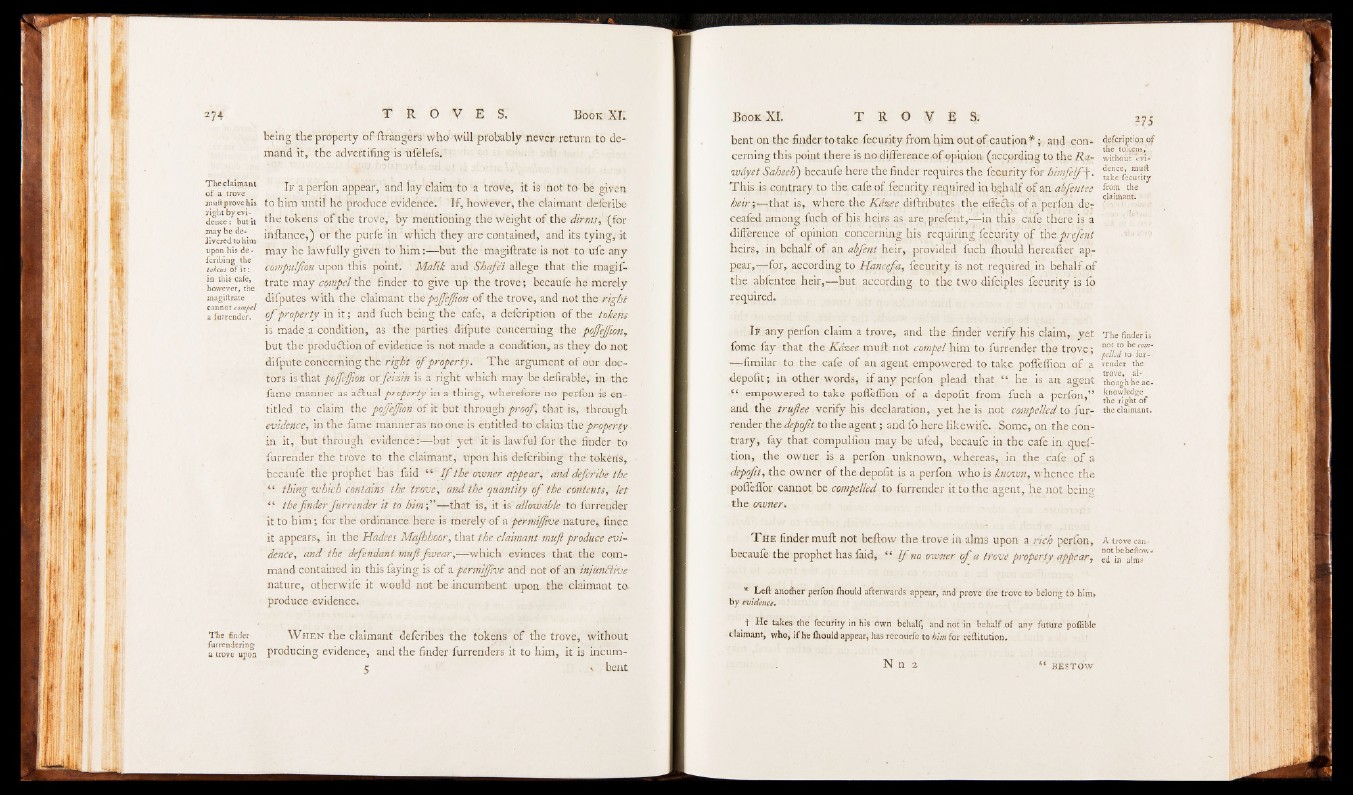
being the property of ftrangers who will probably never return to demand
it, the advertifing is ufelefs.1;
of^a^rove^ If a perfon appear, and lay claim to a trove, it is not to be given
mutt prove his to him until he produce evidence'.'’ If, however, the claimant defcribe
dfnce^butit the tokens of the trove, by mentioning the weight of the dirmsj ’{for
Kveredtohim hiftance,) or the purfe’in which they are contained, and its tying, it
upon his de. 'may be lawfully given to him:— but the magiftrate is not to ufe any
lofau'of it': compuljion upon this point. Malik and Shafe'i allege that the magifhowever
the trate may compel the’ finder to give up the trove; becaufe he merely
magiftrate difputes with the claimant thepojfejjion of the trove, and not the right
afurrender. o f property in it; and inch being the cafe, a defcription of the tokens,
is made a condition, as the parties difpute concerning the pojfejjion,
but the production of evidence is not made a condition,-as they do not
difpute concerning the right o f property. The argument of our doctors
is that pojfejjion or feizih is a right which may be defirable, in the
fame manner as aftual property' in a thing, wherefore no perfon is entitled
to claim the pojfejjion of it but through proof that is, through
evidence, in the fame mariner as'no onesis entitled to claim the property.
in it, but through ‘evidence:— but yet it is lawful for the- finder to
furrender the trove to the claimant, upon his defcribing- the tokens,
becaufe the prophet has faid “ I f the owner appear, and defcribe the
“ thing which contains the trove, and. the quantity o f the contents, let
“ the finder furrender it to, h i m that is, it is"allowable to furrender
it to him; for the ordinance here is merely-of a permiffive nature;, fince
it appears, in the Hadees Majhhaor, that the claimant mufi produce evidence,
and the defendant muftft,wear,— which evinces that the command
contained in this faying is of a permijfive and not of an injmBive-
nature,- otherwife it would not be-incumbent upon the claimant to.
produce evidence.
The finder W hen the claimant defcribes the tokens of the trove, without
a*trove'upon producing evidence, and the finder furrenders it to him, it is incum-
5 \ bent
bent on the finder to take fecurity from him out of caution*}, ,an<J concerning
this point there is no difference of çpiuion (accprdipg to the Ra-
•wdyet Saheeh') becaufe here the finder requires the fecurity for himfelf\.
This is contrary to the cafe o f fecurity .required in hghalf of oxi abfentee
heir y— that is, where the Kdzee di(tributes,.the effects of a perfon de;
ceafed among fuch of his heirs as are. prefent,-— in this cafe there, is a
difference of opinion concerning his requiring fecurity of the.prefent
heirs, in behalf of an abfent heir, provided luch fhoufd hereafter apr
pjear,— for, according to Hanefci, fecurity is not required, in behalf,of
the abfentee heir,— but according to the two difciples fecurity is fo
required.
I f any perfon claim a trove, and the finder verify his claim, yet
feme fay that the Kdzee muft not compel him to furrender the trove,;
— fimilar to the cafe of an agent empowered to take poffeffion of a
depofit; in other words, if any perfon plead that “ he is. an agent
“ empowered to take poffeffion of a depofit from fuch a perfon,”
and the truftee verify his declaration, yet he is not compelled to furrender
the depofit to the agent ; and fo here likewife, Some, on the contrary,
fay that eompulfion may be ufed, becaufe in the cafe in quef-
tion, the owner is a perfon unknown, whereas, in the cafe of a
depofit, the owner of the depofit is a perfon who is known, whence thé
poffeflbr cannot be compelled to furrender it to the agent, he not beina:
the owner.
T he finder mufi: not bcftow the trove in alms upon a rich peffen,
becaufe the prophet has faid, “ I f no owner o f a trove property appear,
* Le ft another perfon fliould afterwards appear, and prove the trove to belohg to him)
b y evidence.
t He tak es the fe cu r ity in his Own behalf, and not in b eh a lf o f an y fu tu re poilible
cla im an t, w h o , i f he fh ould appear, has recourfe to him fo r r e ftitu tio n .
66
defcription of
the tokens,;
without evidence,
muft
take fecurity
from the
claimant. ■
The finder is
not to be compelled
to furrender
the
trove, although
he acknowledge
the right of
the claimant.
A trove cannot
bebeftow*
ed in alms
N n 2 B E S T O W